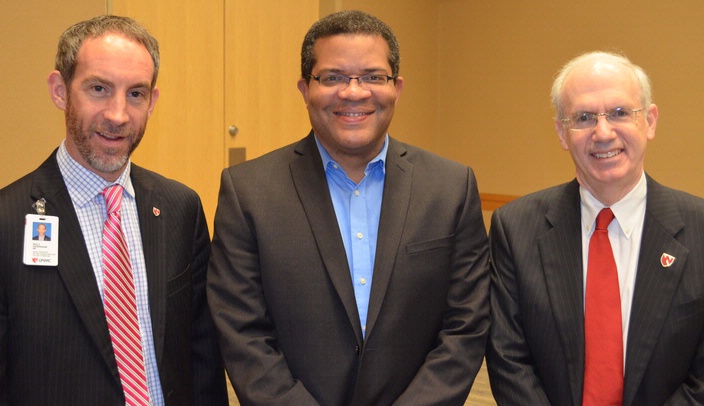Change the narrative.
The was the call made by Anthony Iton, M.D., J.D., the keynote speaker at Wednesday’s UNMC/Nebraska Medicine Health Equity Symposium.
Dr. Iton was speaking to a group of UNMC and Nebraska Medicine leaders who were meeting to reflect upon the role that individuals and teams have in providing equitable care to the patients and populations served at UNMC/Nebraska Medicine.
Dr. Iton drew from his experiences, including his time as director for the Alameda County Public Health Department in California, to deliver a wide-ranging presentation on health equity and how “the narrative” — “the story we tell ourselves about who we are,” he said — shapes socio-ecological and medical policies and practices that impact health outcomes throughout the United States.
“We let people suffer, and then we blame them,” he said. “And then the health system tries to deal with them in 15 minutes.”
Dr. Iton discussed research he had participated in in Alameda County that showed significant life expectancy differences between ZIP codes, noting a correlation between income and life expectancy — to the point that each additional $12,500 in household income in the Bay Area equated to an extra year of life. He added that there are “much deeper explanations” for such discrepancies than the two often-cited causes – bad behaviors and limited access to health care.
“Eighty percent of what influences life expectancy happens outside the health care system,” he said.
Dr. Iton noted that although the United States spends more than most countries on health services, most peer countries spend more money on social benefits and social services and get better health care outcomes. He said 33 countries now have longer life expectancies than Caucasians in the U.S. have. This compares to 17 countries in 1990. He called for the health care system to “lean into” the community, providing larger incentives for community participation to drive changes.
“Rather than helping people beat the odds, we have to change the odds,” he said.
Kelly Caverzagie, M.D., associate dean of educational strategy at UNMC and vice president of education at Nebraska Medicine, opened the conference with a call to attendees to engage in the conversation around health equity.
UNMC Chancellor Jeffrey P. Gold, M.D., noted that an emphasis on health equity “is not new to this organization.” And Nebraska Medicine CEO Dan DeBehnke, M.D., M.B.A., said in a recorded statement that the symposium would help “identify opportunities and next steps” for the medical center.
Following Dr. Iton’s presentation, the event continued through the day with breakout groups and panel discussions.

This was a very good symposium but more action steps need to be addressed for further discussion. We need a formal plan to make sure there are levels of accountability. Clearly, we all must take ownership for this to really address equity and health disparities. Dr. Iton's presentation was excellent.
Dr. Iton’s presentation was AWESOME, he really gets it. I hope that these conversations continue and we use vehicles such as the RIDE Initiative to “Lean In” to our internal campus zipcodes to enable us to change the narrative when we “Lean In” to our community.
Thank you, Wayne and Maria! The Office of Health Professions Education agrees!! Look for more to come. In the meantime, please feel free to reach out to us at ohpe@nebraskamed.com or 402-559-9700.